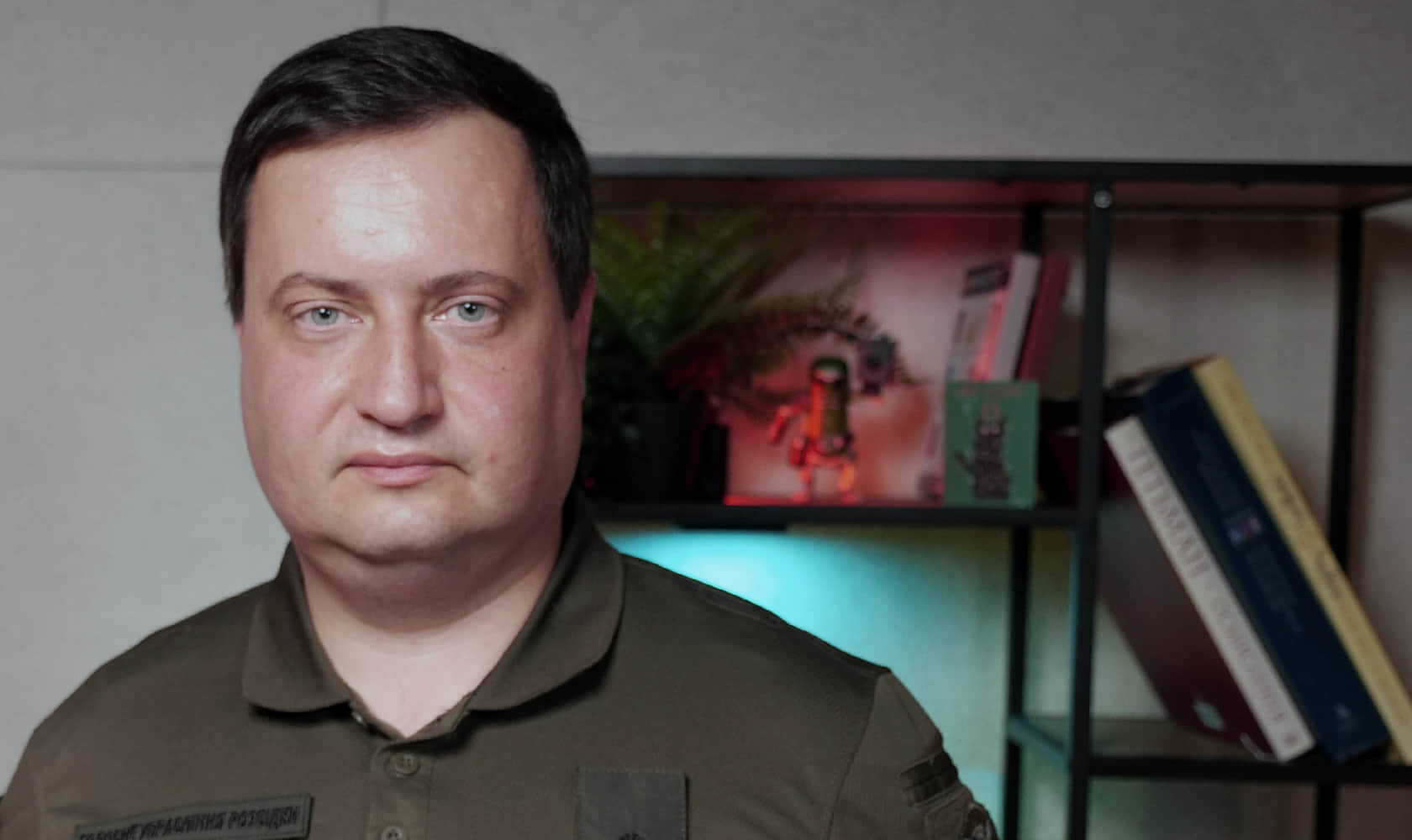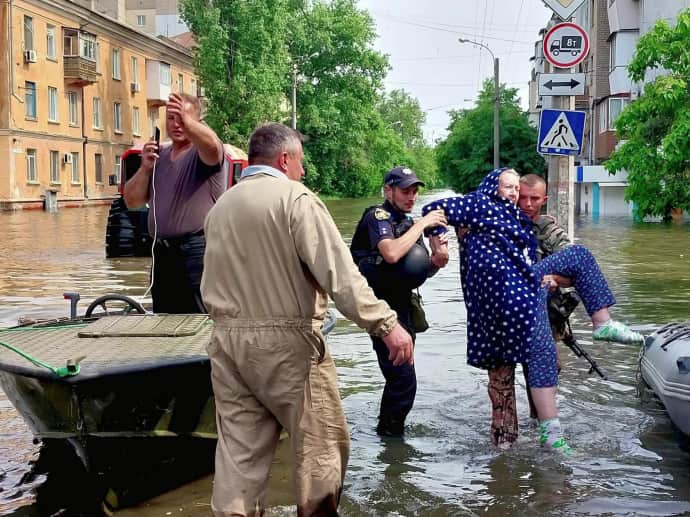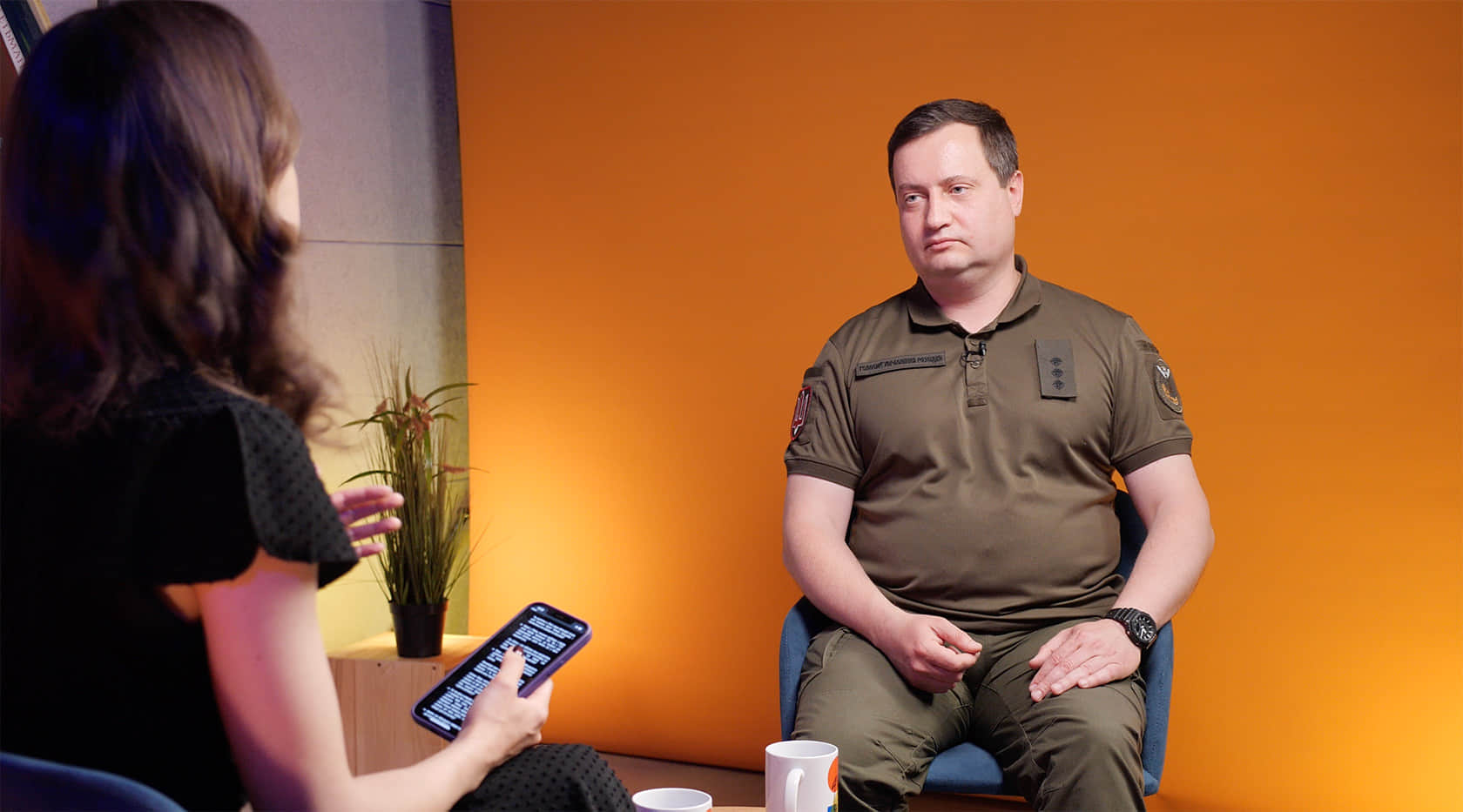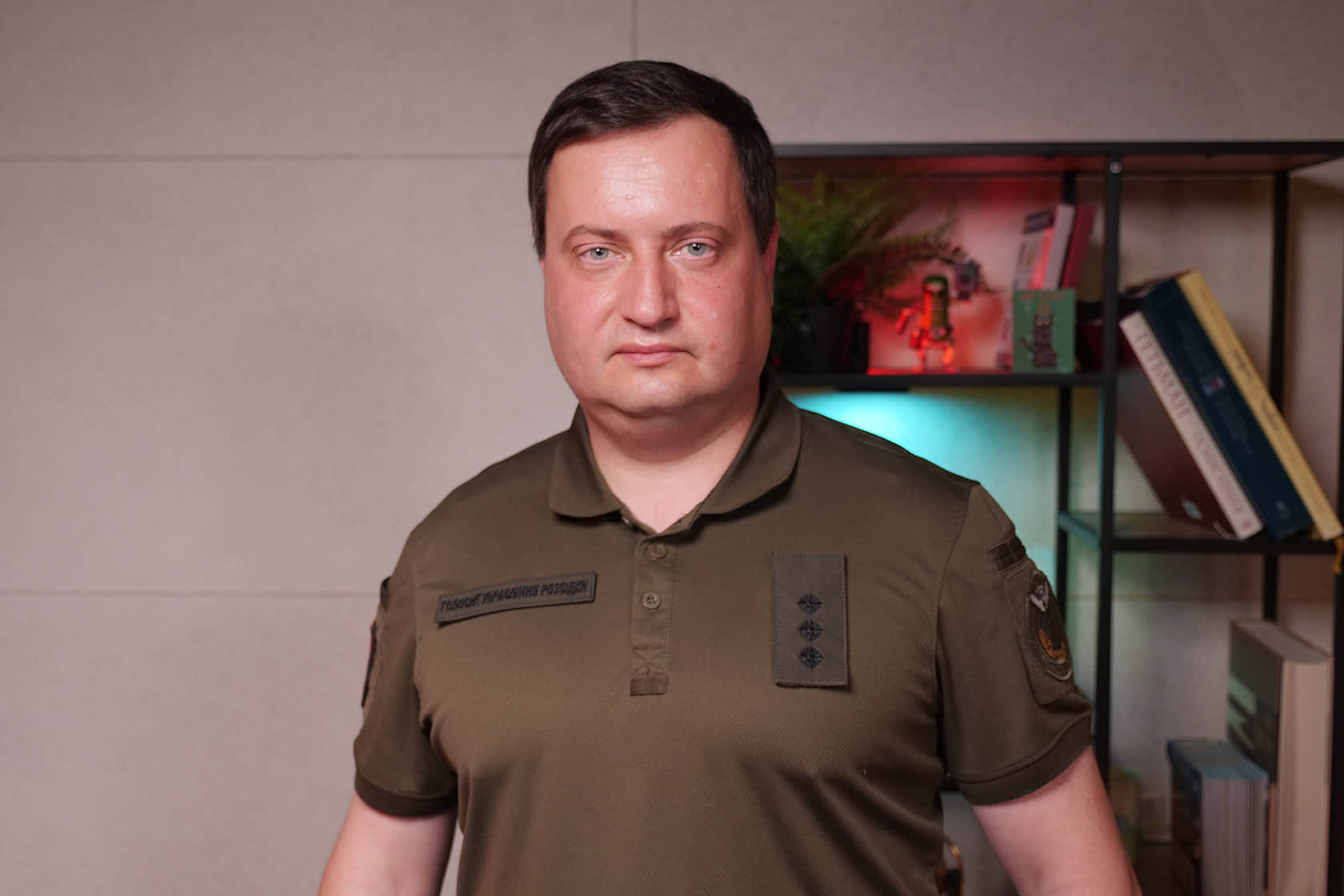Why didn't Ukrainian forces enter Crimea by late spring as the country's spy chief promised? Military intelligence spokesman Andrii Yusov explains

Kyrylo Budanov, Chief of Defence Intelligence of Ukraine (DIU), has announced numerous times since last September that the Armed Forces of Ukraine would enter Crimea by the end of spring 2023. However, it still hasn’t happened, and Andrii Yusov, spokesman for DIU, now describes it as merely a possible scenario.
When can we expect Ukrainian troops to enter occupied Crimea?
Who might have given the order to blow up the Kakhovka Hydroelectric Power Plant (HPP) and who might have carried it out?
What impact have recent events in Russia’s Belgorod Oblast had on the mood of the country’s military and political leadership?
What is going on inside the Russian Armed Forces?
How many combat missions has Kyrylo Budanov personally taken part in?
Ukrainska Pravda put all of these questions to Andrii Yusov in our interview.
Below are the main points of the conversation. Watch the full version here (in Ukrainian).
"A lot of Russian occupiers in Crimea have packed their bags"
"The Armed Forces of Ukraine will enter Crimea by the end of spring 2023." DIU Chief Kyrylo Budanov has forecast this in various interviews.
Spring 2023 is over, and for some reason this prediction hasn't come true. Why not?
We are talking about scenarios. This isn't a bet at the bookie's or a tear-off calendar on the wall.
Adjustments do occur. However, the overall situation and the overall assessment remain the same: Ukraine will definitely regain Crimea. This is exactly where Budanov's words will be prophetic.
What date can this forecast be adjusted to now?
As the Ukrainian security and defence forces are in the active phase of their operations, I believe it would be wrong to discuss specific dates. But I think the weather will be warm.
These days we're hearing a lot of explosions in Crimea, seeing smoke rise over various strategic facilities, and watching cyberattacks on local TV, where various speeches by Volodymyr Zelenskyy or the Ukrainian Defence Ministry have been broadcast.
What effect does all this have on the mood of the occupying authorities in Crimea and those who support them?
This has a positive and encouraging effect on the mood of the large section of the local population who are waiting for liberation.
As for the representatives of the occupying administration, this is yet another indication that they are temporary guests there. A lot of them have packed their bags and sent their families away to relatively safe places.
The ordinary occupiers remain. Nobody cares about their opinion. And even if they are panicking (and they are), no one pays any attention to that.
People are now talking about specific problems with the water supply in Crimea due to the blowing up of the Kakhovka Hydroelectric Power Plant (HPP).
Read more: Everything you need to know about the Kakhovka HPP disaster
DIU has frequently said that Russian troops mined the plant back in April 2022. Do you know what type of explosives the Russian invaders used to do this, and in what quantity?
Criminal proceedings have been initiated, the investigation is ongoing, and all data is being provided only as part of this investigation.
Yes, these were explosives. Yes, it was an explosion from the inside and a controlled detonation. That’s the information we can make public as of now.
Does DIU know yet who gave the order to blow up the Kakhovka HPP and exactly who carried it out?
I can tell you what I think. Since this terrorist attack is comparable in scale to the full-scale invasion of Ukraine, the decision was made by the Russian dictator [Vladimir] Putin, and the final order came directly from him. No other entity or person on the territory of the so-called Russian Federation would have taken on that level of responsibility.
Who carried out the order?
Who carried it out? The Russian units deployed in the area around the Kakhovka Hydroelectric Power Plant and dam have been identified. However, I assume other special forces would also have been involved in the mining phase. I'm convinced that there was a separate reserve group (in case the regular military refused to perform this task).

The blowing up of the Kakhovka HPP falls under the classification of a "war crime" according to the Rome Statute of the International Criminal Court.
Back in October, Kyrylo Budanov said that the perpetrators of such crimes would be sought by the "Ukrainian Mossad" [an organisation founded to look for war criminals and bring them to justice], and that it was already in operation.
If that's the case, how many staff does it have? What kind of operations does it conduct? And what role does Defence Intelligence play in this?
I'm not going to disclose that for security reasons. Still, if we analyse the various incidents that have occurred to collaborators, traitors and Ruscists [people who back the ideology of Putin's regime] in the temporarily occupied territories and in Russia over the past year, you can easily put two and two together.
However, Ukraine is a civilised country. And the major war criminals (Putin and his entourage) should be tried by the International Criminal Tribunal. And for that to happen, they have to be brought there. And the work on this is ongoing.
"Budanov is a key target for Putin's regime"
A while ago, the commander of the Kraken special unit said in an interview with a colleague of mine that DIU chief Kyrylo Budanov personally participated in a special operation to liberate the village of Ruska Lozova in Kharkiv Oblast at the end of April 2022.
How often does Kyrylo Budanov take part in such combat missions, and why does he do it?
That's just one example, and it's not the only operation in which Kyrylo Budanov has been directly involved.
He sets an example of motivation, planning and implementation of tasks for both soldiers and commanders.
I believe that Defence Intelligence of Ukraine can only benefit from this. After all, having a commander on the ground, who knows and sees what is happening, means that the decisions taken are more responsible and necessary.
How many of these combat operations are we talking about?
Quite a few.
Speaking about DIU's activities in general, what are the most significant operations?
Some of those that we can discuss publicly are, for example, Zmiinyi (Snake) Island, the air bridge to Mariupol (with the delivery of equipment and food and evacuation of the wounded), the liberation of Kharkiv Oblast (areas where DIU's Kraken special forces unit took an active part), the defence of Kyiv Oblast (the Shaman battalion), and the International Legion (this has also been a unique, excellent and interesting experience [for DIU]).
Russian propaganda recently claimed Kyrylo Budanov had been killed. This turned out to be fake news, but it is clear that during the full-scale invasion, Ukraine's senior military and political leadership has been under special scrutiny by Russian forces and secret services.
How many assassination attempts have there been on Kyrylo Budanov during this time?
There have been more than ten attempts.
Mr Budanov confirmed in February of this year that a missile had hit the premises of Defence Intelligence of Ukraine. Have there been any other missile attacks on DIU since then?
You are asking questions to which there is no appropriate public answer. Nevertheless, I can say for sure that DIU continues its effective work. All departments, everything related to information work, data collection and many, many other areas (both public and non-public), did not stop working productively even for an hour.
The enemy has been trying to impact the work of the defence and security sector in various ways and they will continue to do so. However, DIU will not stop [its work] and has not stopped it for a single hour.
"Russia cannot afford to launch large-scale missile strikes as it did at the start of the war and last winter"
While on the subject of Russian missiles, Mr Budanov has said many times that Russia has enough [missiles] for "two or three major attacks".
However, we can see that, for example, in May, the frequency of missile attacks on Ukraines capital increased significantly. How is Russia able to do this?
They are still able to produce new missile weapons. Furthermore, when we talk about missile strikes, there are different types.
They spared no missiles during the first stage of the full-scale invasion and later when they were trying to push Ukraine into a complete blackout. That was when Russia used up most of its existing stockpile of high-precision missile weapons.
There was a certain lull after the winter's totally unsuccessful episode with the so-called missile blitzkrieg on the energy sector. And they have manufactured some in the meantime. The Ruscists can produce about 30 Kalibr missiles a month, for example, but fewer Kinzhals [hypersonic cruise missiles] or Iskanders [ballistic missiles].

Besides, their tactics have also changed. They are now hybrid, with Shaheds [attack UAVs], ballistic missiles and cruise missiles being used simultaneously.
Whereas prior attacks were carried out throughout Ukraine, Russia is now targeting core areas. And Kyiv has now become a sacred target for the Putin regime.
They still have the resources for these attacks. However, they do not have the resources to repeat the massive missile attacks that were carried out across Ukraine at the beginning of the full-scale invasion and last winter.
Iran recently claimed that it has developed a hypersonic missile. How likely is it that it will end up in Russian service? And in general, how extensive is the military assistance from Iran to Russia at the moment?
Military cooperation between Iran and Russia is ongoing. We can see this in the batches of drones being supplied to the Russian Federation.
Is there a threat of ballistic missile supplies? That is what the Russian regime would like to get. But so far, we have no records of any such deliveries. Both Ukraine and the coalition of our partners are doing everything possible to prevent this from happening.
What countries does Russia currently receive military aid from?
We have mentioned Iran. There's still Belarus - there are all sorts of possibilities for repairing, recovering and de-mothballing equipment there. There is some information about North Korea. The list of countries is not that long.
Then there are stories of grey-market deals, shell companies and dual-use goods. But this is harder to combat, because sometimes it's difficult even to make allegations of such things.
And there's weapons smuggling, of course. Russia is the number one country in terms of finding and attempting to set up channels for smuggling weapons into its territory.
Given all of the above, how would you assess the current state of the Russian Armed Forces' equipment?
Everything they upgraded and showcased to the world has been either used up or destroyed.
But it's a large country with vast stocks of old Soviet weapons and some new production capabilities.
They do have a severe shortage of modern optics and electronics, but at the same time, they have the capacity to manufacture them. So they still pose a threat.
"The line between covert and overt mobilisation in Russia is becoming increasingly thin"
Speaking of personnel, what's the mood like now in the Russian army?
Morale has been deteriorating not only in the occupying forces but also in Russia's military and political leadership as a whole. They’re aware of the strategic impasse they are in. They have no idea how to get out of it. It's hard to imagine they'd be in a good mood.
DIU and the Ukrainian Defence Ministry jointly run the I Want to Live project, which offers Russian soldiers the opportunity to surrender voluntarily. How popular has it been with the Russian military, and how many have surrendered along with their military equipment?
We have been consistently receiving over 3,000 requests a month from Russian servicemen who would like to participate in this project.
Each one of these requests is an individual special operation that is difficult to carry out. We are talking about hundreds of people who have been taken out.
There are very few cases of people surrendering along with their equipment (a few dozen). Implementing an idea like this from conception to execution is a highly complex process.
Is there covert mobilisation in Russia, and to what extent?
The line between covert and overt mobilisation is becoming thinner and thinner for Putin's regime every day, with elements of a digital concentration camp (such as electronic draft notices) actively being used.
They plan to make mobilisation arrangements the norm so that there is no need to cover them up at all.
We've seen certain regions of Russia experiencing some turbulence lately, particularly Belgorod Oblast. What impact do these events have on the mood of Russia's military and political leadership, and on Putin personally?
He is in a bad mood, as is his entourage, as no one can tell him the truth, and no one really wants to lie.
"Putin's visits to the occupied Ukrainian south are an absolute farce"
Generally speaking, when DIU representatives talk about Putin, you often hear them saying "There isn't just one Putin - there are several." And I always wonder: what evidence do you base this on besides the fact that these people may look different?
Putin uses doppelganger technology. This is a fact based on both operational intelligence and assessments by physiognomists and many other experts.
Could you give us a specific example to demonstrate that it was one of Putin's doubles rather than him who was in a particular place at a particular time?
His visits to the occupied south [of Ukraine] were an absolute farce (poorly and hastily organised). The difference in "Putin's" behaviour and appearance was vast. He would never have got into that vehicle or looked like that. He wouldn't have talked to the supposed local people, since we know that access to the real Putin in the Kremlin is highly restricted, even for his own people (the multi-metre-long table that is getting longer and longer; the quarantines that everyone undergoes).
If Putin keeps his distance even when meeting representatives of foreign countries, not even shaking hands, then what we saw in Mariupol and occupied Kherson Oblast was definitely staged and acted out.
Do you have any information on where these doppelgangers live in Russia? Are they all in the same place?
Not just one.
Are they in contact with each other?
They are in restricted areas and under extremely close guard.
[Self-proclaimed Belarusian President] Lukashenko, by the way, does not have a body double.
How come?
He's too out of the ordinary. That's why I think that other than Ukrainian parodists, no one could have played that role.
"The 'collective Putin' is growing more and more aggressive"
Speaking in general about Russia's military and political leadership, who are in the strongest positions and who are in the weakest?
[Former FSB chief] Nikolai Patrushev has, as ever, remained an influential actor. Dmitry Medvedev [Deputy Chairman of Russia's Security Council] is just a figurehead. [Defence Minister] Sergei Shoigu appears to be still in the system - to a large extent perhaps not even of his own free will, but he has nowhere to run.
The circle is getting tighter and tighter, and the "collective Putin" [senior officials from the administrative and political establishment of Putin’s regime who are actually in control of Russia] is becoming more aggressive and less trusting of those around him

How would you assess the current activities of Russia's Main Intelligence Directorate, the Foreign Intelligence Service and the FSB? How powerful, influential and inventive are they in their covert operations?
Unlike the regular army, which is often rightly mocked, Russia's intelligence services are still quite dangerous, with enormous resources allocated to their work, maintenance and operations. They should not be underestimated.
How much they are listened to, how much their opinions are taken into account, and how much accurate information they can provide is a different matter. Given the decision to launch a full-scale invasion, it's obvious that the collection and transmission of data could be better.
Nevertheless, they pose a severe threat even beyond Ukraine's borders.
"Trubitsyn got permission to leave the country because of the system, not who he was"
I'd also like to talk about DIU agents. This is generally classified information, but recently there have been several cases when they have revealed themselves.
For example, an escort named Ksiusha Maneken announced that she had received the Award for Assistance to the Military Intelligence of Ukraine, 2nd Class.
Could you explain how this person helped DIU? What kind of story is this?
I think going public with this information was a mistake.
But she did help. As far as I know, she helped quite a lot. I'm talking about work on the information front, not agent work.
So her assignments were to do with information?
Yes.
It's natural that Ukraine's Defence Intelligence, like the intelligence services of any country in the world, should use the help of entirely different people (with diverse backgrounds and life paths) to achieve its interests and protect national security. That's how it should be.
If anyone thinks that we only cooperate with PhDs and professors with impeccable reputations - we don't.
There have also been questions about Vladyslav Trubitsyn, a member of Kyiv City Council suspected of corruption. DIU issued him with a special letter at the request of another agency that enabled him to leave the country. He has not been in contact since.
Does DIU regret doing this?
This isn't about who he was, it's about the system.
At the time, neither the border service, nor those who submitted the letter, nor those who signed it, had any legal grounds for not letting this person leave the country. There were no such grounds.
But of course, such things should not happen again.
I hope that this person will come back and actively participate in justice-related activities. But if that doesn't happen, I wouldn't rule out him coming back to Ukraine in another way.
What way?
In some other way.
If the border service had put a mark next to his name indicating that he was under suspicion and his travel was restricted, he would not have been allowed to leave even with a letter. A letter is not a free pass.
In other words, are you partially absolving DIU of responsibility for the letter being issued?
No, I'm just stating the facts. If anyone had known he wasn't going to come back, of course they wouldn't have signed anything. The people who make use of the documents are the ones who bear most of the responsibility.
Sofiia Sereda, UP
Translation: Artem Yakymyshyn
Editing: Teresa Pearce